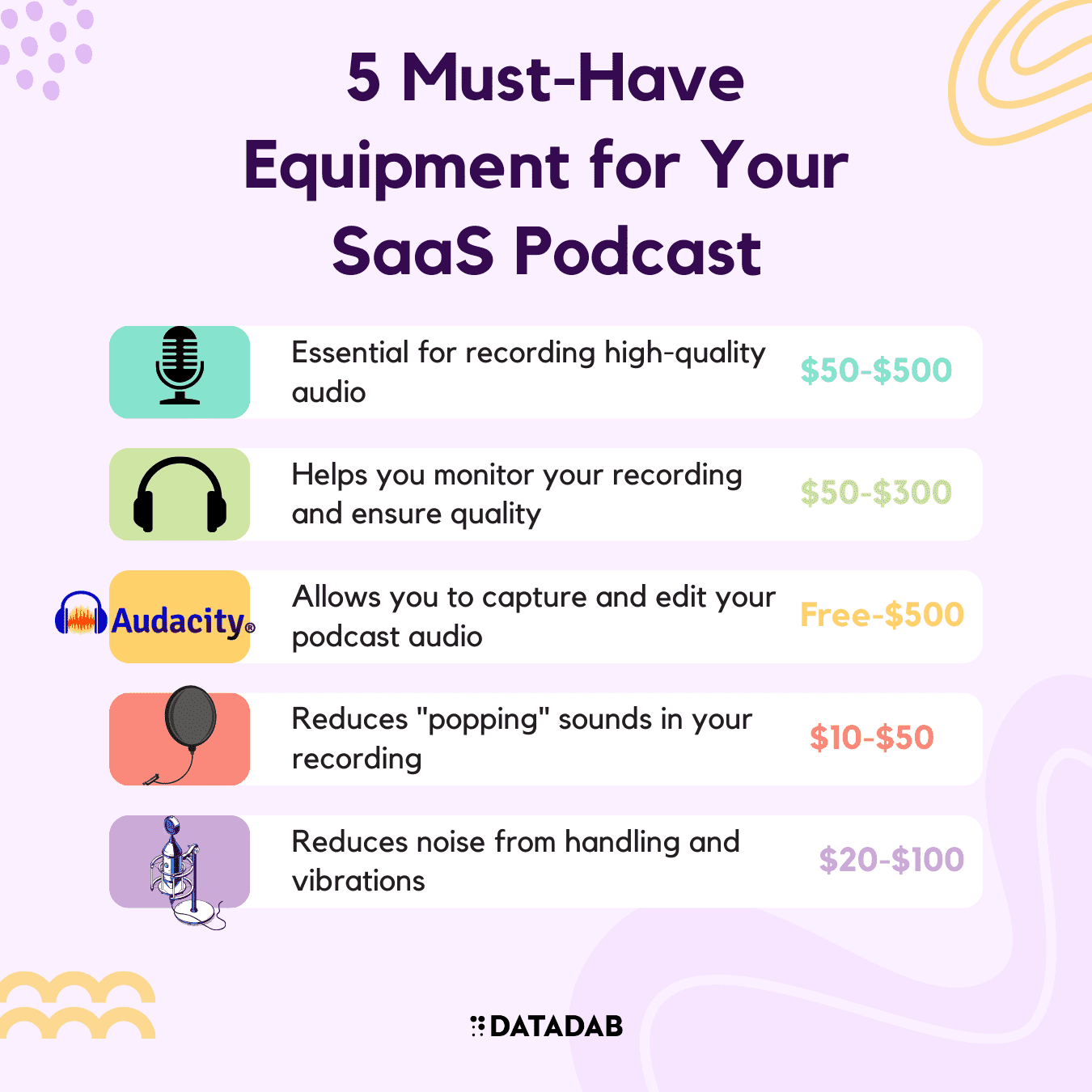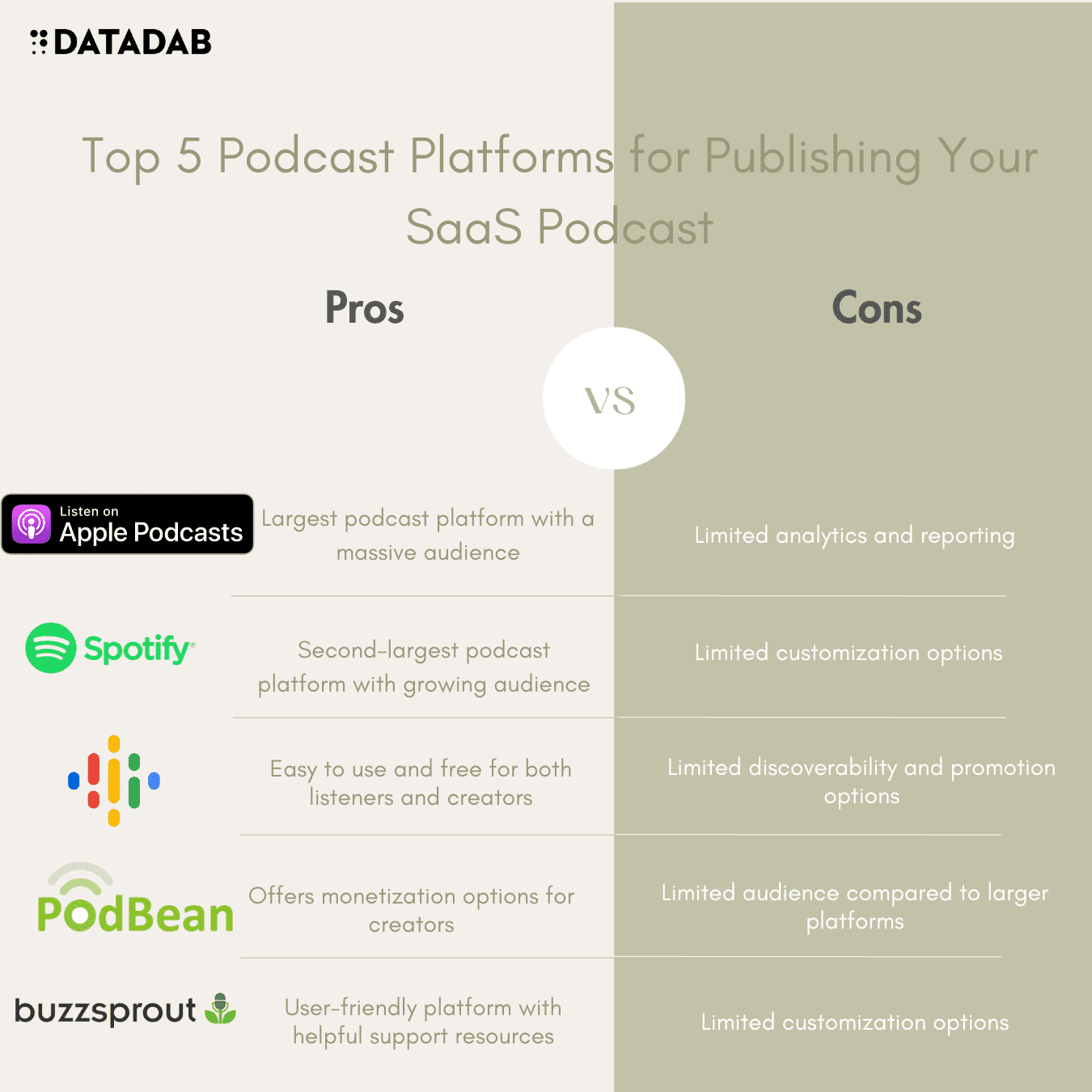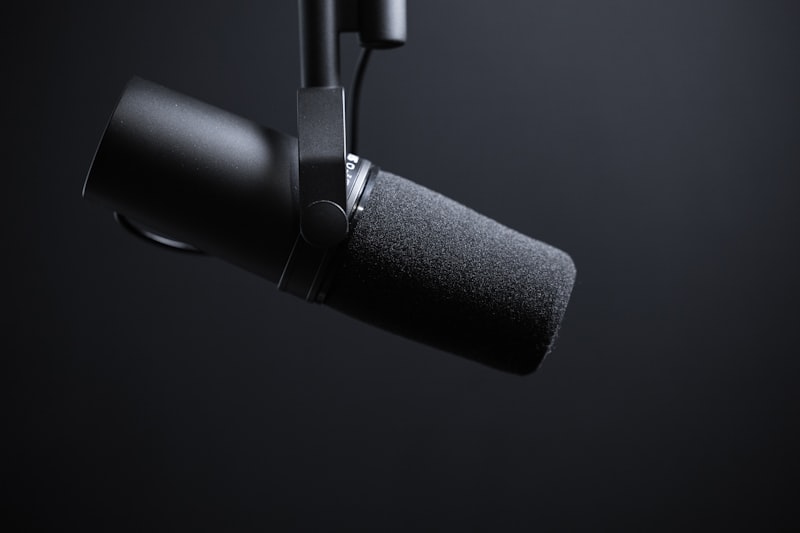"Podcasting is the ultimate intimacy medium."
- Pat Flynn
You are constantly on the lookout for new and innovative ways to engage your target audience and promote your brand. One strategy that has gained immense popularity in recent years is podcasting. Podcasts offer a unique opportunity to connect with your audience on a more intimate level and build trust and credibility with them over time.
In this guide, we will take a deep dive into everything you need to know about using podcasts as a marketing tool for your SaaS business. We'll discuss why podcasts are so effective and how to get started with your own podcast. We'll also share some tips for creating a successful SaaS podcast and provide examples of successful podcasts in the industry.
If you are new to podcasting or have been considering starting your own podcast, this guide is for you. We will walk you through every step of the process, from choosing a topic to promoting your podcast to help you achieve your marketing goals and connect with your audience in a more meaningful way. So, let's get started!

Why Podcasts are So Effective for SaaS Marketing
Podcasts have exploded in popularity over the past few years, with millions of people tuning in to listen to their favorite shows on a regular basis. And there are a few reasons why podcasts are so effective for SaaS marketing:
1. Podcasts offer a unique opportunity to connect with your audience
Podcasts are a highly personal medium, and listeners often feel like they're having a one-on-one conversation with the host. This makes podcasts a great way to connect with your audience on a deeper level and build trust with them over time.
2. Podcasts can help you establish your brand as a thought leader
By creating high-quality, informative content that speaks directly to your target audience's pain points and challenges, you can position your brand as a thought leader in your industry. This can help you establish credibility and authority, and make it easier to attract new customers.
3. Podcasts are highly engaging and can drive brand awareness
Podcasts are a highly engaging medium, and listeners often tune in for hours at a time. This means that you have the opportunity to capture your audience's attention for an extended period, and build brand awareness in the process.


How to Get Started with Your Own Podcast
If you're sold on the idea of using podcasts as a marketing tool for your SaaS business, the next step is to get started with your own podcast. Here's what you'll need to do:
Podcast Topic Brainstorming Worksheet
Use the prompts below to brainstorm niche podcast topics that are relevant to your target audience and align with your brand:
Target Audience Analysis:
- Core roles and titles of your listeners:
- Specific goals and pain points they experience:
- Topics and issues they care about most:
- What conversations are they already having?
- What information are they seeking?
Your Brand Expertise:
- What is your niche area of expertise?
- What unique perspectives and insights can you provide?
- What topics reinforce your thought leadership?
- What conversations are currently missing your input?
Topic Idea Brainstorm:
- Recent industry news/innovations to analyze:
- Counterintuitive insights around audience pain points:
- Influential experts to interview:
- Tactical advice to overcome audience challenges:
- New approaches to tired industry conversations:
- Case studies and key lessons learned:
- Underserved audience needs you can address:
- Controversial stances to unpack:
- Emerging trends and predictions:
- Other ideas:
Evaluating Topics:
- Does it resonate with a key audience segment?
- Is it a fresh/unique take on the topic?
- Does it reinforce your expertise and thought leadership?
- Will it attract high-value links and shares?
Choose 1-3 strong topic ideas based on the criteria above. Outline episodes and begin creating content!
1. Choose your topic and format
The first step in creating a successful podcast is to choose a topic that resonates with your target audience. Ideally, your podcast should focus on a topic that's related to your business, and that your audience is already interested in.
In terms of format, there are a few different options to choose from. You can create a solo podcast where you share your thoughts and insights on a particular topic, or you can bring on guests to provide different perspectives and insights. You can also create a co-hosted podcast where you and a partner discuss various topics related to your industry.
Podcast Equipment Buyer's Guide
A guide to selecting the right podcasting equipment for your needs
Microphones
- USB Microphones: Easy plug-and-play setup, built-in ADC, often have limited controls. Good for beginners. Examples: Blue Yeti, Audio-Technica AT2020USB.
- XLR Microphones: Require audio interface for connectivity and control. Higher sound quality potential but more complex. Examples: Shure SM7B, Rode NT1.
- Lavalier Microphones: Clip-on mics providing hands-free use. Better for on-the-go recording. Example: Sony ECMCS3
Audio Interfaces
- Enable XLR mic connectivity and control over gain, monitoring, etc. Examples: Focusrite Scarlett 2i2, PreSonus AudioBox iOne.
- May require other equipment like microphone, headphones, cables, and stands.
Headphones
- Closed-back: Isolate sound and prevent audio bleed. Good for tracking. Example: Sony MDR-7506.
- Open-back: Allow ambient sound in. Better for mixing/editing. Example: Sennheiser HD 600.
Podcast Recording Software
- Apple GarageBand: Free option for Mac users with intuitive interface.
- Adobe Audition: Robust editing tools for professionals. Subscription required.
- Hindenburg: Powerful multitrack editor with transcription features. Expensive.
Other Equipment
- Pop filters block plosives and mouth noises.
- Shock mounts reduce vibration noise.
- Mic stands provide stable positioning.
- Cables, adapters, etc. to connect your setup.
Consider your experience level, budget, and recording needs when selecting podcasting tools. Quality equipment improves your end product.
2. Invest in quality equipment and software
Once you've chosen your topic and format, it's time to invest in quality equipment and software. At a minimum, you'll need a high-quality microphone, headphones, and recording software. You may also want to invest in a soundproofing setup to ensure that your recordings are clean and clear.
3. Plan your episodes and create a production schedule
Before you start recording your podcast, it's important to plan out your episodes and create a production schedule. This will help you stay organized and ensure that you're consistently publishing high-quality content that resonates with your audience.
4. Record and edit your episodes
With your equipment and schedule in place, it's time to start recording your episodes. Make sure to take your time and get comfortable with the recording process. You may need to do a few test runs to get everything just right.
Once you've recorded your episodes, the next step is to edit them. This involves trimming any unnecessary sections, adjusting the sound levels, and adding any intro/outro music or sound effects. It's important to take the time to edit your episodes carefully, as this will have a big impact on the overall quality of your podcast.
5. Publish and promote your podcast
Once you've recorded and edited your episodes, it's time to publish them and start promoting your podcast. There are a few different platforms you can use to publish your podcast, including Apple Podcasts, Spotify, and Google Podcasts. Make sure to create eye-catching cover art and write compelling episode descriptions to entice people to listen.
To promote your podcast, you can use social media, email marketing, and your website to spread the word. Encourage your listeners to leave reviews and share your podcast with their networks to help increase your reach.

Podcast Sponsorship One-Sheet
[Podcast Name] offers incredible sponsorship opportunities to reach our highly engaged audience of [target listeners].
About Our Podcast:
- [Short podcast description]
- [Specify episode release frequency]
- [List platforms where available]
Our Listeners:
- [X number] monthly downloads
- [X%], [X%], [X%] - top listener locations
- [X%] male, [X%] female
- Ages: [list age range percentages]
Sponsorship Benefits:
- 30-60 second sponsored ad read during podcast
- Brand mentioned in episode show notes
- Dedicated social media post about sponsor
- Brand logo and link on podcast website
Pricing:
- 1 episode sponsorship: [price]
- 3 episode sponsorship package: [discounted price]
- 6 episode sponsorship package: [discounted price]
Let's partner together and reach our passionate listeners! Please reach out to discuss sponsorship opportunities for [Podcast Name].
Tips for Creating a Successful SaaS Podcast
Creating a successful SaaS podcast takes time and effort, but the rewards can be significant. Here are a few tips to help you get the most out of your podcast:
1. Choose topics that are relevant to your audience
When planning your podcast episodes, make sure to choose topics that are relevant to your target audience. Think about the challenges and pain points they're facing, and create content that speaks directly to those issues. This will help you attract and retain listeners over time.
2. Invest in quality production values
The production values of your podcast will have a big impact on how professional and polished it sounds. Make sure to invest in quality equipment and software, and take the time to edit your episodes carefully. This will help you create a podcast that's engaging and easy to listen to.
3. Be consistent with your publishing schedule
Consistency is key when it comes to podcasting. Make sure to stick to a regular publishing schedule, whether that's weekly, biweekly, or monthly. This will help you build a loyal audience that knows when to expect new episodes.
4. Engage with your listeners
One of the great things about podcasts is the opportunity they offer for two-way communication. Make sure to engage with your listeners by responding to comments and feedback, and asking for their input on future episodes. This will help you build a sense of community around your podcast, and keep your listeners coming back for more.
Top 5 SaaS Podcasts for Inspiration
| Podcast | Description | Host(s) | Topics Covered |
|---|---|---|---|
| The SaaS Revolution Show | Features interviews with top SaaS thought leaders | Alex Theuma | SaaS industry trends, entrepreneurship, and leadership |
| SaaStr | Provides practical advice and insights for SaaS founders and executives | Jason Lemkin | SaaS sales, marketing, and fundraising |
| The Growth Hub Podcast | Focuses on growth marketing strategies for SaaS businesses | Edward Ford | SaaS marketing, branding, and growth strategies |
| The SaaS Sales Performance Podcast | Explores how to build and scale high-performing SaaS sales teams | Scott Ingram | SaaS sales best practices and strategies |
| SaaS Marketing Insights | Offers actionable advice for marketing your SaaS business | Tom Hunt | SaaS marketing, branding, and growth strategies |
Examples of Successful SaaS Podcasts
There are plenty of great SaaS podcasts out there that demonstrate just how effective this medium can be for marketing your business. Here are a few examples:
1. The SaaS Revolution Show
The SaaS Revolution Show is a weekly podcast that focuses on all things SaaS. Hosted by Alex Theuma, the show features interviews with some of the top minds in the industry, as well as insights and advice for SaaS founders and executives.
2. SaaStr
SaaStr is a podcast that covers a wide range of topics related to SaaS, including sales, marketing, and fundraising. Hosted by Jason Lemkin, the show features interviews with SaaS leaders and experts, as well as practical advice and insights for entrepreneurs and business leaders.
3. The Growth Hub Podcast
The Growth Hub Podcast is a podcast that focuses on growth marketing strategies for SaaS businesses. Hosted by Edward Ford, the show features interviews with growth marketing experts, as well as practical tips and advice for growing your SaaS business.
Conclusion
Podcasting can be a highly effective marketing tool for SaaS businesses. By creating high-quality, informative content that speaks directly to your target audience, you can establish your brand as a thought leader in your industry, drive brand awareness, and connect with your audience on a deeper level.
To get started with your own podcast, choose a topic that resonates with your audience, invest in quality equipment and software, plan your episodes and create a production schedule, record and edit your episodes, and publish and promote your podcast across multiple platforms.
Remember to focus on topics that are relevant to your audience, invest in quality production values, be consistent with your publishing schedule, and engage with your listeners to build a sense of community around your podcast.
By following these tips and best practices, you can create a successful SaaS podcast that helps you achieve your marketing goals and build a loyal audience of engaged listeners.
FAQ
1. What is a SaaS podcast?
A SaaS podcast is a type of podcast that focuses on topics related to software as a service (SaaS) businesses, such as industry trends, entrepreneurship, sales and marketing, and growth strategies. The goal of a SaaS podcast is to provide valuable insights and advice to SaaS founders, executives, and marketers, as well as to promote the brand and establish the host as a thought leader in the industry.
2. How can a SaaS podcast benefit my business?
A SaaS podcast can benefit your business in several ways. It can help you build brand awareness, establish your business as a thought leader in your industry, and connect with your target audience on a deeper level. A successful podcast can also drive traffic to your website, generate leads, and even create new revenue streams through sponsorships or advertising.
3. How do I choose a topic for my SaaS podcast?
When choosing a topic for your SaaS podcast, consider the needs and pain points of your target audience. What challenges do they face in their businesses, and how can your podcast provide solutions and insights? You should also consider your own expertise and interests, as well as the overall focus and goals of your brand.
4. What equipment do I need to start a SaaS podcast?
To start a SaaS podcast, you will need a few essential pieces of equipment, including a microphone, headphones, recording software, and a pop filter. The type and quality of equipment you choose will depend on your budget and specific needs, but investing in high-quality equipment can help you create a more professional and engaging podcast.
5. How often should I publish new episodes of my SaaS podcast?
Consistency is key when it comes to podcasting. You should aim to publish new episodes on a regular schedule, whether that's weekly, biweekly, or monthly. This will help you build a loyal audience that knows when to expect new content and will help you maintain momentum in promoting your podcast.
6. How do I promote my SaaS podcast?
To promote your SaaS podcast, you can leverage social media, email marketing, your website, and collaborations with other podcasters or brands. Make sure to create eye-catching cover art and write compelling episode descriptions to entice people to listen. You should also engage with your listeners by responding to comments and feedback, and asking for their input on future episodes.
7. How can I measure the success of my SaaS podcast?
To measure the success of your SaaS podcast, you can track metrics such as downloads, listenership, engagement, revenue, and churn rate. These metrics will help you understand how your podcast is performing and provide insights into areas for improvement. You can use analytics tools provided by your podcast platform, such as Apple Podcasts or Spotify, to track these metrics.
8. How do I get guests for my SaaS podcast?
To get guests for your SaaS podcast, you can reach out to industry experts, influencers, or other thought leaders in your field. You can also leverage your network and ask for referrals or recommendations. Make sure to provide clear value to your guests and offer a platform to share their expertise and insights.
9. How long should each episode of my SaaS podcast be?
The ideal length for a SaaS podcast episode can vary depending on your audience and topic. Generally, episodes that are between 20 and 60 minutes in length tend to be the most engaging and effective. However, the length of your episodes should be determined by the amount of content you have to share and the attention span of your target audience.
10. How do I monetize my SaaS podcast?
There are several ways to monetize your SaaS podcast, including sponsorships, affiliate marketing, and direct advertising. You can also offer premium content or exclusive access to your audience in exchange for a subscription or membership fee. To effectively monetize your podcast, you should focus on creating high-quality content that provides value to your listeners and aligns with the goals and values of your brand.



